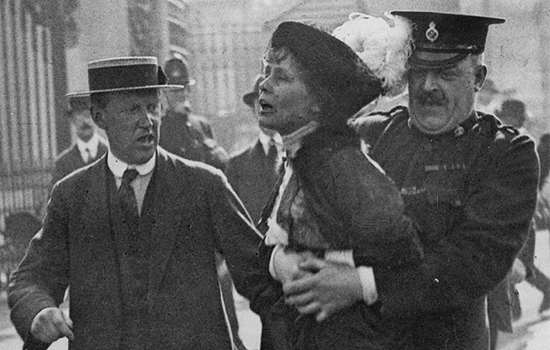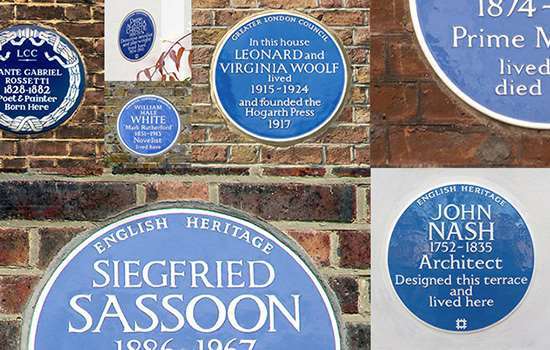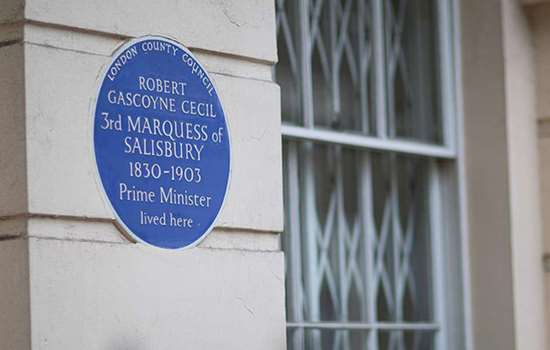Granville, Christine (1908-1952)
Plaque erected in 2020 by English Heritage at 1 Lexham Gardens, Kensington, London, W8 5JL, Royal Borough of Kensington and Chelsea
All images © English Heritage
Profession
SOE Agent
Category
Armed Forces
Inscription
CHRISTINE GRANVILLE born KRYSTYNA SKARBEK 1908-1952 SOE Agent lived here 1949-1952
Material
Ceramic
Christine Granville, born Krystyna Skarbek, was one of the most remarkable secret agents of the Second World War, undertaking many successful missions and using her language skills, powers of persuasion, and sheer courage to save countless lives. She was also Britain’s longest serving female agent.
Number 1 Lexham Gardens, Kensington – then the Shellbourne Hotel – was Granville’s home for the last three years of her extraordinary life.
Early life
Maria Krystyna Janina Skarbek was born in Warsaw on 1 May 1908. Her father was Count Jerzy Skarbek, a Polish aristocrat, while her mother, Stefania Goldfeder, came from a Jewish banking background. She grew up on a grand country estate, where she spent much of her time riding horses, running wild, and learning to use guns and knives. After her father died in 1930 the family moved to Warsaw, where at one point Krystyna took a job in a salesroom above a garage.
Following a short-lived first marriage Krystyna met a Polish diplomat, Count Jerzy Giżycki, on the ski slopes. They married in November 1938, and spent their time travelling and socialising.
Polish missions
When Germany invaded Poland the Giżyckis were in southern Africa. Determined to help defend their country, they immediately left for London, where Krystyna engineered a meeting with George Taylor of the Secret Intelligence Service (MI6). She proposed a fantastical scheme to travel to neutral Hungary, ski over the mountains to Poland and bring out volunteers and information. ‘She is a flaming Polish patriot, an expert skier and great adventuress,’ Taylor reported. ‘I really believe we have a PRIZE.’ He recruited her as the organisation’s first female spy.
From the winter of 1939–40 onwards Krystyna made several journeys in and out of Poland, trekking and skiing across the border, smuggling in money, arms and explosives, and bringing back valuable intelligence – once on rolls of microfilm carried inside her gloves – as well as escapees.
On her first mission, in Budapest she met Andrzej Kowerski, a Polish army officer and agent. They became lovers and soulmates, and remained so off and on – despite her many other lovers – for the rest of her life. In January 1941 the Gestapo arrested them in Hungary, and after two days’ interrogation Krystyna bit her tongue to make it seem that she was coughing up blood. A chest X-ray revealed lung scarring from the exhaust fumes from the garage where she had worked 15 years earlier, and she and Kowerski were immediately released as likely TB sufferers.
To help their escape, they were given British passports and new names. Krystyna became Christine Granville, the name she formally adopted when she was later naturalised as a British subject.
France
After a period employed by the Special Operations Executive (SOE) in Cairo, when Granville was trained as a wireless operator, on 7 July 1944 she was parachuted into Nazi-occupied southern France to act as courier to Francis (‘Roger’) Cammaerts, the SOE officer in charge of subversive activities east of the Rhône. Soon she was acting as his second-in-command, travelling widely through enemy-held territory, conveying messages between the members of his network and keeping them motivated. When the Germans carried out a huge offensive on the Vercors plateau, Granville and Cammaerts escaped the massacre that followed by hiking 70 miles in 24 hours.
Granville’s most legendary exploit was securing the release of Cammaerts and two other agents after they had been arrested by the Gestapo and were awaiting execution. She did so by posing as a British agent sent to obtain their release and persuading the captors that, with a British invasion imminent, they would meet a terrible fate if they executed the prisoners. Somehow, the ruse worked – with the help of a 2 million franc bribe and Granville’s charm – and the agents walked free. For her exploits she was awarded a George Medal and OBE by the British and a Croix de Guerre by the French.
London and death
After the war ended the SOE paid Granville off. Eventually, after gaining British citizenship, in early 1949 she moved to London.
From this point on her usual address was the Shellbourne Hotel, 1/3 Lexham Gardens, in Kensington, where she had a regular room on the first floor. The hotel – which comprised two large and quite grand houses, built in the 1870s – was run by the Polish Relief Society to provide cheap accommodation for émigrés.
Despite her war record she was unable to find settled employment, and drifted through a string of short-lived menial jobs before taking work as a stewardess on cruise ships. On one voyage she had a brief affair with another steward, Dennis Muldowney, who became obsessed with her. After she rejected him, he stalked her.
On 15 June 1952 Granville returned to the Shellbourne to find Muldowney waiting there, and he stabbed her to death in the hallway. He was hanged ten weeks later. Granville was buried in the Roman Catholic cemetery at Kensal Green on 21 June.
Further reading
MRD Foot, ‘Gizycka, Countess Krystyna [née Countess Krystyna Skarbeka; alias Christine Granville] (1915–1952)’, Oxford Dictionary of National Biography (Oxford, 2004) (subscription required; accessed 7 Sept 2020)
M Masson, Christine: SOE Agent and Churchill's Favourite Spy: A Search for Christine Granville (London, 2005)
C Mulley, The Spy Who Loved: The Secrets and Lives of Christine Granville (London, 2012)
Christine Granville, Great Lives, BBC Radio 4, 2016 (accessed 7 Sept 2020)


